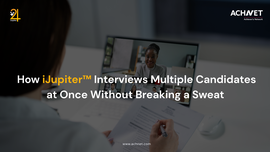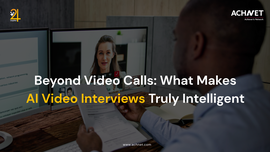Hiring Process: How an AI Agent Compresses Time and Improves Quality
Introduction: The Hiring Process Doesn’t Have to Be Slow or Compromised
The hiring process is one of the most strategic investments a growing organization makes, and when it’s inefficient, it becomes one of the costliest. Industry benchmarks show that the average hiring process takes 3 to 6 weeks and costs roughly $4,700 when you include sourcing, screening, interviews, offer negotiation, and onboarding friction. That timeline often inflates further for roles requiring cultural alignment, nuanced judgment, or multiple manual handoffs.
What if your hiring process could collapse weeks into days, eliminate redundant rounds, and still surface better-fit candidates, with data-backed confidence? AI-agent-driven platforms can reengineer the traditional process into a fast, reliable, and insight-rich workflow. By combining structured AI interviews (for example, using tools like AI Agent iJupiter™), real-time candidate ranking (via an Applicant Ranking System), and automated, role-specific assessment(s), these solutions compress each stage of the hiring process without sacrificing rigor.
The Traditional Hiring Process Timeline and Where It Slows Down
Most hiring teams follow a multi-week cadence that typically looks like this:
- Week 1: Job definition, posting, and sourcing
- Week 2: Application review and initial screens
- Week 3: First-round interviews
- Week 4: Deeper evaluation (second round, presentations, reference checks)
- Week 5: Final stakeholder interviews and shortlisting
- Week 6: Offer extension, negotiation, and final validation
Each stage introduces friction, vague role briefs, inconsistent screening, calendar-coordination headaches, subjective interviewing, delayed feedback, and manual ranking. That friction costs time, drives candidate drop-off, and often undermines quality-of-hire.
By embedding structure, automation, and AI intelligence within each step, organizations can transform this six-week timeline into one measured in days, with clear rationale and minimal manual effort.
Compressing the Hiring Process: Phase by Phase
Phase 1 (Traditionally Week 1) → Instant Role Clarity and Outreach
Pain point: Drafting a precise job description and coordinating stakeholder input can take days, and poorly targeted outreach floods pipelines with misaligned applicants.
AI-agent solution:
- One detailed prompt feeds into an AI agent (e.g., iJupiter™), which instantly generates a job description, assessment plan, and interview workflow.
- Screening criteria and an ideal candidate profile are codified automatically, no iterative review loops.
- Outreach copy is prepared and postings go live immediately, while the applicant ranking system is preconfigured to score incoming applications in real time.
Result: What once took days now happens in minutes, laying a testable, measurable foundation for the rest of the process.
Phase 2 (Traditionally Week 2) → Intelligent, Asynchronous Screening
Pain point: Recruiters often spend a full week manually sifting hundreds of resumes, with inconsistent filters and subjective judgments.
AI-agent solution:
- ARS scores candidates against JD, ranking by relevance.
- Automated, role-specific assessment(s) validate skills in parallel.
- AI interviews apply consistent rubrics and summarize candidate profiles.
Result: A week of screening collapses into hours. Recruiters engage only with top-fit, data-validated candidates.
Phases 3–4 (Traditionally Weeks 3–4) → Collapsed and Structured Interviewing
Pain point: Multiple live rounds and coordination fatigue hiring teams.
AI-agent solution:
- Structured interview-to-insights framework replaces overlapping rounds.
- AI-led asynchronous interviews with scoring.
- Condensed summaries and performance snippets replace raw recordings.
Result: Time-efficient interviews with actionable insights, preserving stakeholder bandwidth.
Phases 5–6 (Traditionally Weeks 5–6) → Offer and Closing with Predictive Confidence
Pain point: Fragmented feedback and delays in offer rollout.
AI-agent solution:
- Shortlist shows predictive fit, soft skill signals, and early reference insights.
- Communication templates streamline offers.
- Reference checks and offer discussion run in parallel.
Result: Hiring decisions and negotiations begin by week 2 or 3.
Common Stretch Factors and AI-Agent Neutralization
- Cultural Alignment: Behavioral rubrics replace culture interviews.
- Creative/Judgment Assessment: Simulated decision-making within interviews.
- Soft Skills & Empathy: Follow-ups reveal tone, empathy, and communication.
Quantifying subjective signals removes bias and unnecessary rounds.
Building a Scalable, High-Performance Hiring Process
- Automated Role Definition & Clarity
- Systematized Workflow Tracking
- Intelligent Screening & Real-Time Ranking
- Parallel Evaluations
- Data-Driven Hiring Decisions
- Post-Hire Feedback Loop
Best Practices for an Accelerated, High-Quality Hiring Process
- Align on Clear Prompts
- Interview Only the Top Tier
- Include Internal Talent
- Streamline Candidate Experience
- Initiate Reference Checks Early
- Be Flexible on Checkboxes
- Automate Communication
- Foster Human + AI Collaboration
Hiring Process Checklist
- Use AI to generate job description and assessment plan
- Activate applicant ranking
- Launch automated assessments
- Run structured AI interviews
- Review ranked shortlist
- Schedule final validation rounds
- Start reference checks and background vetting
- Send personalized offer letters
- Incorporate post-hire performance feedback
Final Thoughts
The traditional six-week hiring process is becoming obsolete. AI agents like iJupiter™, ARS, and intelligent assessments transform hiring into a fast, structured, insight-rich process. Each phase—from JD creation to offer—becomes smarter, faster, and better with AI.
Ready to streamline your hiring process? Book a demo of iJupiter™ and experience firsthand how ACHNET empowers teams to hire with speed and confidence.




